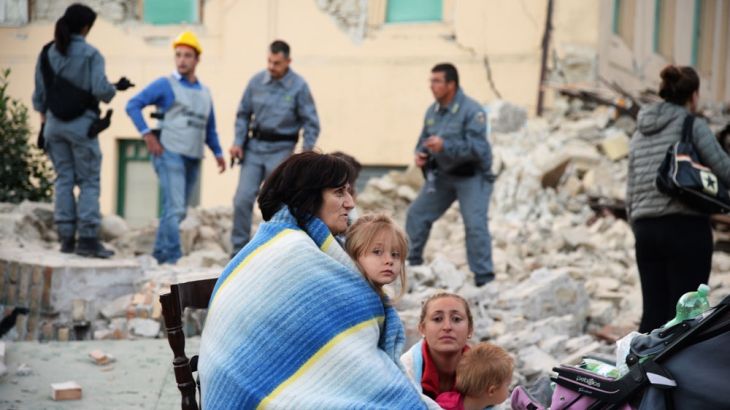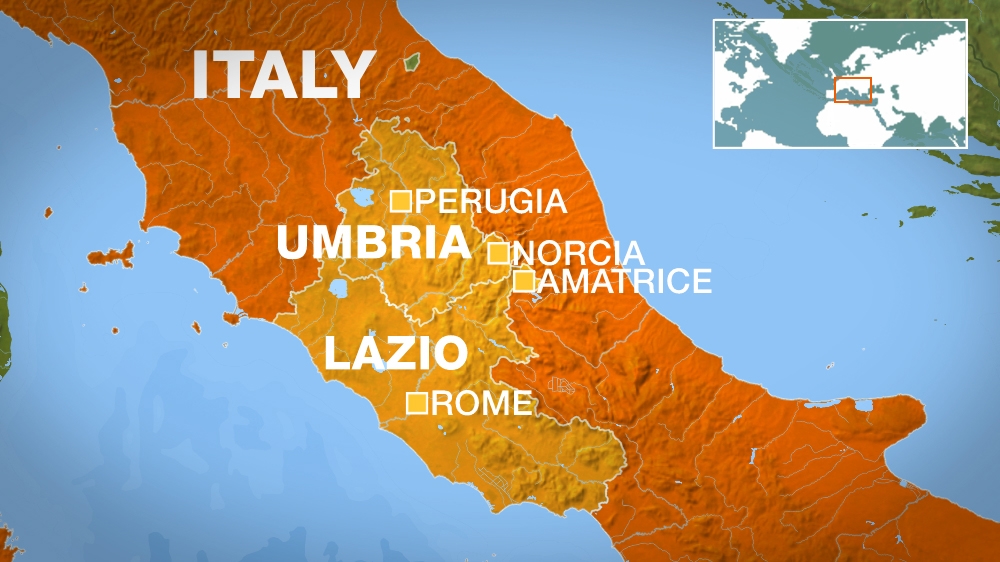Italy earthquake: Rescuers race to find survivors
Italian rescuers worked for the second day in a row to pull survivors from the rubble as death toll crosses 250.

The death toll from a devastating earthquake that hit and flattened central Italian towns climbed to at least 267 as rescuers worked for a second day to find survivors under the rubble of flattened towns.
Italy has declared a state of emergency after Wednesday’s pre-dawn earthquake razed homes and buckled roads in a cluster of mountain communities 140km east of Italy’s capital, Rome.
Keep reading
list of 4 itemsHow is Afghanistan coping six months after deadly quakes?
‘Violent rumble’: 4.8 magnitude earthquake rattles New York City, northeast
Taiwan searches for 18 still missing after Wednesday’s earthquake
It was powerful enough to be felt in Bologna to the north and Naples to the south, each more than 200km from the epicentre.
The US Geological Survey said that it was a 6.2 magnitude quake that hit near the town of Norcia, in the region of Umbria.
An army of emergency workers using sniffer dogs clambered over piles of debris trying to find anyone still buried beneath, while cranes removed huge slabs of fallen masonry and trucks full of rubble left the area every few minutes.
On Thursday afternoon, a violent aftershock measuring magnitude 4.3 sent rescuers fleeing from debris and stones that fell from the severely damaged bell tower of the 15th century church of St. Augustine in Amatrice.
![Hundreds of people spent the chilly Wednesday night in hastily assembled tents [Reuters]](/wp-content/uploads/2016/08/97bc8084a10142e7ab6626fdb9d66f68_18.jpeg)
Many of those killed or injured were holidaymakers in the four worst-hit towns – Amatrice, Pescara del Tronto, Arquata del Tronto and Accumoli – where seasonal visitors swell populations by up to tenfold the summer.
Aerial video taken by drones showed swathes of Amatrice, last year voted one of Italy’s most beautiful historic towns, completely flattened. The town, known across Italy and beyond for a local pasta dish, had been filling up for the 50th edition of a popular food festival this weekend.
The mayor said the bodies of 15-20 tourists were believed to be under the rubble of the town’s Hotel Roma, which he said had about 32 guests when it collapsed on Wednesday morning.
One hotel that collapsed in Amatrice probably had about 70 guests, and only seven bodies had so far been recovered, said the mayor of the town that was one of the worst hit by the earthquake.
“Half the town is gone,” Sergio Pirozzi told RAI state television. “There are people under the rubble … There’s been a landslide and a bridge might collapse.”
“There is a massive rescue operation going on in the town of Amatrice. Thousands of workers from the region participate in the efforts. The town is full of rubble,” Al Jazeera’s Natacha Butler said, reporting from the quake-hit town.

About 365 people injured in Wednesday’s quake were hospitalised, the Civil Protection department said, adding that about 5,000 people, including police, firefighters, army troops and volunteers, were involved in post-quake operations.
Rescuers working with emergency lighting in the darkness overnight saved a 10-year-old girl, pulling her alive from the rubble where she had lain for about 15 hours.
Many other children were not so lucky. A family of four, including two boys aged eight months and nine years, were buried when a church bell tower toppled into their house in nearby Accumoli. Local magistrates opened an investigation into whether there had been any negligence over the recently restored tower.
Prime Minister Matteo Renzi’s cabinet was meeting on Thursday to decide emergency measures to help the affected communities.
“Today is a day for tears, tomorrow we can talk of reconstruction,” he told reporters late on Wednesday.
The death toll appeared likely to rival or even surpass that from the last major earthquake to strike Italy, which killed more than 300 people in the central city of L’Aquila in 2009.
WATCH: Return to L’Aquila – Broken Promises
Gilberto Saccorotti, a geologist at Italy’s National Institute for Geophysics and Volcanology, told Al Jazeera: “That particular area has a long history of very [powerful], very energetic seismicity. It’s not surprising to have had a [powerful] earthquake there.
“From my knowledge of the area, the roads are very narrow, so if one road fails, the connection may become very difficult … The depth [of the earthquake] is quite shallow, about four kilometres. Usually the typical depth is in the order of 10 kilometres.”
Saccarotti said it was difficult to predict whether there would be another earthquake or more aftershocks.
The last major earthquake to hit Italy struck the central city of L’Aquila in 2009, killing more than 300 people.
![Italy sits on two fault lines, making it one of the most seismically active countries in Europe [Gregorio Borgia/AP]](/wp-content/uploads/2016/08/1e87be5645364d178f08467eaf6894f7_18.jpeg)
![Rescuers lift an injured victim after the 6.2 magnitude earthquake [Remo Casilli/Reuters]](/wp-content/uploads/2016/08/305743de4136418bbd8c924773293644_18.jpeg)